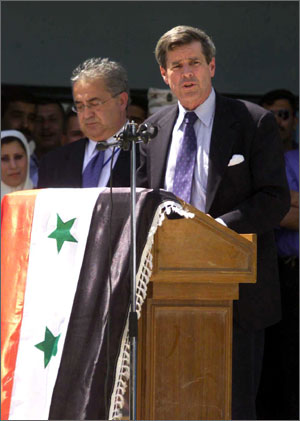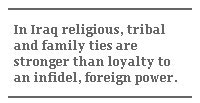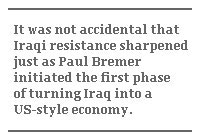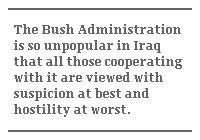US Nation-Building Abroad – Part I
US Nation-Building Abroad – Part I

LONDON: Addressing the American people on May 24, US President George W. Bush admitted that “disgraceful conduct by a few American troops” had dishonored the US, but he seemed not to recognize its disastrous effect on the whole Iraq war effort. The publication of the pictures of the Iraqi detainees in the Abu Ghraib jail run by the Pentagon – described by defense secretary Donald Rumsfeld as ‘blatantly sadistic, cruel and inhumane’ – is likely to prove the tipping point in the Iraq War and its aftermath. With Iraq’s supposed links to Al Qaida and its possession of weapons of mass destruction (WMD) already discredited, the pictures of humiliated, naked prisoners stripped away Bush's last public justification for his invasion of Iraq,
The Abu Ghraib scandal, followed by Gen. John Abizaid’s disclosure to a Congressional committee that military commanders had investigated 75 cases – more than double the figure given earlier by the Pentagon – of prisoner abuse in Iraq and Afghanistan, has struck at the very root of America’s self-proclaimed moral authority.
Washington’s moral authority collapsed at a time when its mighty military machine failed to capture the Sunni city of Falluja and impose its will on the Shia holy cities of Najaf and Karbala. The fierce and successful resistance by Muqtada al Sadr’s militia demonstrates that in Iraq religious, tribal and family ties are stronger than loyalty to an infidel, foreign power.

In Baghdad, the high-profile assassination of Izzedin Salim, president of the Iraqi Governing Council, on May 19 showed that the Sunni insurgents remained active. This has made the task of the United Nations envoy, Lakhdar Brahimi, to name the provisional government all the more difficult, as the number of Iraqis willing to cooperate with the Anglo-American occupiers dwindles fast.
So, June 30, the date of transfer of sovereignty to the Iraqis by the US-led Coalition Provisional Authority (CPA), has become all the more significant. A perception has grown in Washington that after that date any blame for failures and mishaps in Iraq will fall on the Iraqi entity, while America's own soldiers -- relieved of the fractious and dangerous task of maintaining security in urban areas, and garrisoned in out-of-town bases -- remain ready to assist the Iraqi security forces if and when needed.

But this transfer of sovereignty is not part of an exit strategy. No matter what the Bush Administration says publicly, it has no intention of quitting Iraq voluntarily in the near future. Not only would that undo its plan of transforming Iraq in America’s own image, but it would also hand a huge victory to the Arab militants, with incalculable consequences for the Middle East.
On the other hand, in occupied Iraq, nationalism and Islam have converged, creating an unmatched combination that is driving not just armed insurgency but also permissible political activity. Iraqi leaders, secular and religious, are dead set against America’s military-economic domination of their country, which is the ultimate objective of the Bush team – as described by Paul O’Neill, who served as Bush’s treasury secretary for two years, and Gen. Jay Garner, the first US administrator in Iraq.
In Ron Suskind’s "The Price of Loyalty: George W. Bush, the White House, and the Education of Paul O’Neill", the former treasury secretary described how at the US National Security Council (NSC) meeting on February 1, 2001, Rumsfeld launched into an assessment of broader US goals in Iraq. "Imagine what the region would look like without Saddam and with a regime that is aligned with US interests," he said. "It would change everything in the region and beyond. It would demonstrate what US policy is about." He then talked about post-Saddam Iraq, the Kurds in the north, the oilfields, and reconstruction of the country’s economy along the free market lines.

Last March, in an interview with the BBC, Gen. Garner said that he was dismissed summarily from his job partly because he wanted to hold elections as soon as possible, which clashed with the priorities of his political masters, intent on privatizing Iraqi industries as part of a plan dating back to late 2001.
It was not accidental that just as Paul Bremer initiated the first phase of turning Iraq into a US-style economy with his Order 39, privatizing 200 Iraqi industries and opening them up to 100 per cent foreign ownership, that Iraqi resistance sharpened.
While the rise in guerrilla attacks in the Sunni-majority area of Iraq received ongoing publicity, the western media paid no attention to the vehement objection that Grand Ayatollah Ali Husseini Sistani raised regarding the radical transformation of his country’s economy, which in his view clashed with Islamic principles.

Transforming Iraq’s economy into a free-for-all capitalism is one of the most important facets of the Bush Administration’s project in Iraq. The other aspect is to shape the country’s security and intelligence agencies in the image of America, and to develop long-term cooperation. Both these aspects are to be secured, as American strategic analysts have written, by establishing US military bases in a country that borders six important states, thus furnishing Washington, at the very least, with leverage to pressure the regimes in Iran and Syria.
The Bush White House is trying to gain legitimacy for the caretaker Iraqi government through a draft UN Security Council resolution introduced on May 24. At the Council, the skeptical France and Russia are in no mood to fight the US, but they will be bargaining over shortening the time when the Multi-National Force is to be reviewed and specific language which entitles the caretaker Iraqi government to order the Multi-National Force to leave. There is no prospect of any major country contributing troops to the Multi-National Force. Indeed, the erosion of the 'coalition of the willing', started by the newly elected government of Spain in March, will continue, thus leaving the US and the UK more exposed than before.
The Bush Administration is so unpopular in Iraq that all those cooperating with it, whether Iraqi or non-Iraqi, are viewed with suspicion at best and hostility at worst. There is even speculation that Ahmad Chalabi, until recently the poster boy of the Pentagon, is pulling an anti-American stunt in order to raise his credibility among the Iraqis. The UN is almost as unpopular among Iraqis as America. Iraqis remember that it was the UN who imposed the most comprehensive sanctions against them for 13 years that reduced their living standards by 90 per cent. In a telling acknowledgment of their difficult role, the otherwise vaguely couched resolution has one specific provision, the creation of a special force to protect the UN mission in Iraq.
A recent USA Today/ CNN poll showed that only about a quarter of Iraqis surveyed had a favorable view of America or the UN. If one were to discount the views of generally pro-US Kurds (one sixth of the population) Iraqi Arabs favorable to the US would drop to only 10 percent. The prospects for a UN-US-nominated Iraqi transitional government to last long enough to hold elections by January 2005 are very dim indeed.
Dilip Hiro is the author of “Iraq: In the Eye of the Storm.” His latest book is “Secrets and Lies: Operation ‘Iraqi Freedom’ and After” (Nation Books, New York).